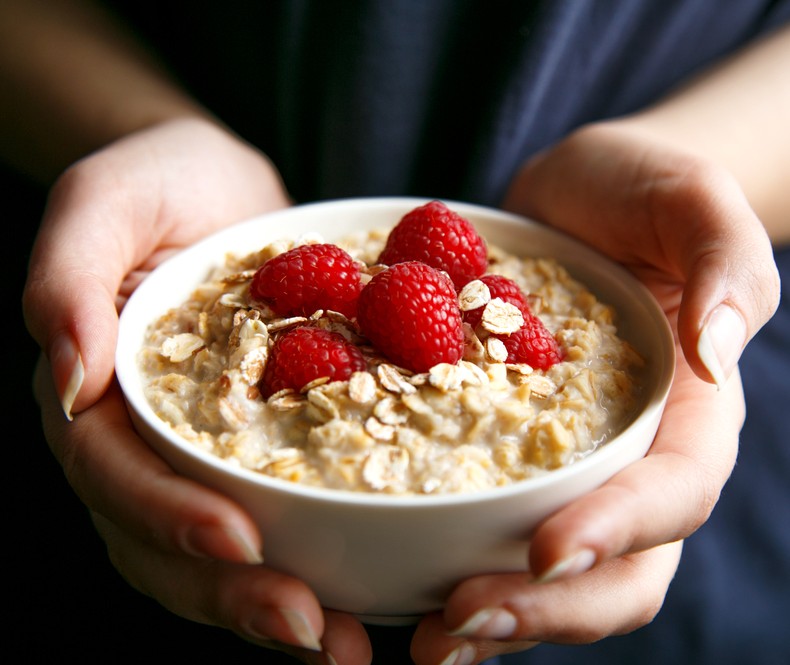 What Happens to Your Body When You Eat Oatmeal Every Day
What Happens to Your Body When You Eat Oatmeal Every Day

Oatmeal has been touted as one of the best breakfast foods you can eat. It is very popular not only for its taste but because it is so easy to make. You can make them into a quick porridge or soak them overnight to make a quick grab and go breakfast. You can even bake them into muffins or make them into a waffle or pancake batter. But there is another reason oatmeal comes so highly recommended: it is good for you! There are several health benefits that you can take advantage of by eating oatmeal. To learn just how beneficial it is, here’s what happens to your body when you eat oatmeal every day.

You can feel fuller for longer periods of time
Oatmeal is full of fiber, which is a great way to fight back urges to overeat. The body cannot digest fiber, so it slows down digestion. This helps you to feel less hungry for a longer period of time. It can also help to regulate blood sugar. “Having oats for breakfast or incorporated into different foods as meals and snacks is a great way to give the meal more staying power and help you feel fuller for longer,” according to Maggie Michalczyk, RDN. Cooking up a hearty bowl of oats every morning is one way to increase your oat intake, and keep your cravings for unhealthy foods in check for the rest of the day. Add in some honey and fruit to satisfy any cravings for sweet foods and treats.

It can help with bowel movements
Oats are a great food for improving the movement of bowels and digestion. “Oats contain a special type of soluble fiber called beta-glucan,” says Michalczyk. “Beta-glucan forms a gel-like consistency in the gut and helps to keep things moving in your digestive tract and keep you regular.” A way to make your oatmeal even more healthy for your digestive system is to pair it with some insoluble fiber too. This can be something like nuts, blackberries, or apples. The insoluble fiber helps to make sure everything keeps moving through your digestive tract easily and smoothly.

You will improve your heart health
Another benefit of oatmeal is that it can help to reduce the risk of heart disease. The fiber content in oatmeal helps to lower what is known as bad cholesterol, or LDL. It also regulates blood sugar and lowers high blood pressure, all of which helps to improve heart health. This ultimately all helps to minimize the risk of any cardiovascular disease developing over time. So oatmeal is definitely a heart healthy food to consume on a regular basis.

Your gut health will improve
Oatmeal is a great food for your gut. This is because oatmeal is considered a prebiotic, which feeds good bacteria in your gut. This helps to keep the balance of good bacteria and bad bacteria intact, which helps to boost your overall immune system. “Incorporating a wide variety of plant foods like oats is also beneficial for gut diversity, which is another important aspect of gut health,” says Michalczyk. A review in the 2021 edition of the Journal of Nutrition states that oat consumption has been linked to an increase in beneficial bacteria groups in the gut.

Your weight loss efforts will be boosted
If you are trying to lose weight, oatmeal is a great resource to use. The beta glucan in oats does great things for hyperglycemia, which helps to reduce blood lipid levels, according to a review in the 2011 issue of Foods. “The fiber content of oatmeal is filling and satiating, which in turn can help with eating fewer calories throughout the day and managing your weight,” says Michalczyk. “Beta-glucan may also promote the release of peptide YY, a hormone produced in the gut that helps with satiety.” These are all ways that oats can help with weight loss.

Overall, the key ingredients in oats make it such a great choice for a healthy breakfast. Fiber and key nutrients in oats help you to ward off disease and keep your body feeling healthy and strong. incorporating oats into your diet has a number of benefits to your health and wellness and is easy to add to several meals.